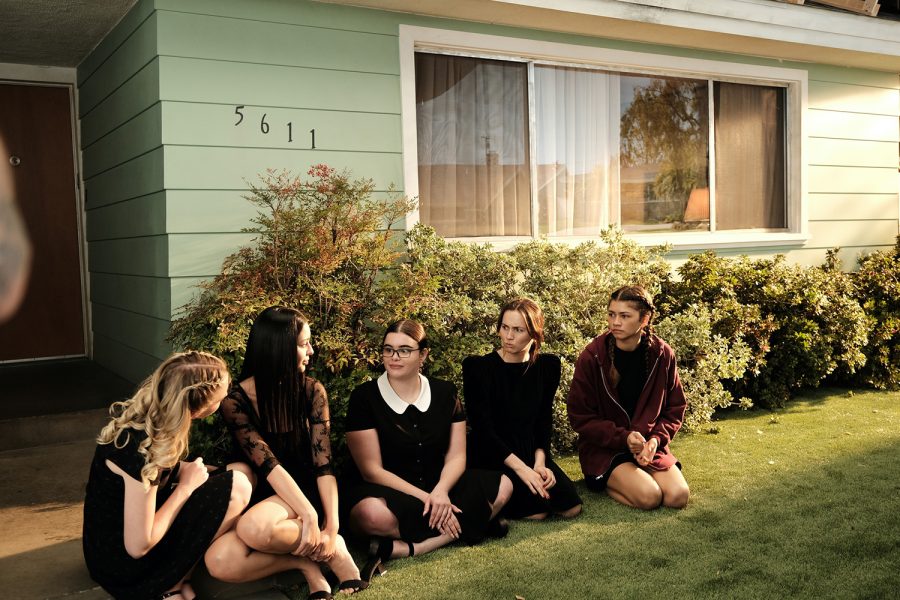‘Euphoria’ captivates audiences through the struggle for love and acceptance
Sydney Sweeney, Alexa Demie, Barbie Ferreira, Maude Apatow and Zendaya in Season Two of HBO’s Euphoria. Photo courtesy of Warner Media.
March 23, 2022
After concluding its second season on Feb. 27, “Euphoria” became the most tweeted-about show of the decade, according to Twitter.
“Euphoria” is a show produced by HBO Max that follows the lives of high school students, with Rue Bennett, portrayed by actress Zendaya Maree Stoermer Coleman, at the forefront.
While Season One felt more relatable to many, focusing on the realistic aspects of high school, Season Two explored a new level of intensity as it discussed topics such as domestic violence, suppressed sexuality, hypersexuality and drug abuse.
The entire cast from the first season, including actors Jacob Elordi, Alexa Demie and Hunter Schafer, returned as their original characters from Season One. Viewers were also introduced to new characters like Dominic Fike’s Elliot, and Chloe Cherry’s Faye.
The first episode of Season Two opens with New Year’s Eve, which many consider to be one of the most festive times of the year. Writer and director Sam Levinson wanted to portray the irony of the new year being a time for a fresh start and new beginnings, while illustrating how that does not seem to be the case for the “Euphoria” characters.
Each character had their own conflicts this season that only escalated as the show went on. Nate Jacobs having sex with Cassie Howard, the best friend of Nate’s ex-girlfriend Maddy Perez, was one plot point that took the spotlight. What begins as a hookup at the New Year’s Eve party soon turns into one of the most prominent storylines of Season Two.
The intensity of these plots are accompanied by a peek into each of the characters’ lives, which reveals their own histories and present-day conflicts. What connects them all, and seems to be the prevalent theme of this season, is their yearning to receive love and acceptance.
Love is a complicated concept, and trying to navigate that feeling is what drives all of these characters.
This undeniable want from the characters is what also created a genuine connection between them and the audience. Viewers understand what they want, know what they need and are equally frustrated yet understanding when they see these characters make questionable decisions.
Cassie seemed to be one of the most well-received characters in Season One. Her charismatic personality and reputation as a supportive best friend made her easily loveable. Season One exposed some of her insecurities, but in Season Two viewers are shown the impact these insecurities have on her life.
Cassie and Lexi’s father, who lives with an alcohol and drug addiction, is no longer a part of their lives. As viewers saw later on in the season through Lexi’s play, she and Cassie have very different memories of their father. While Lexi slowly watched her father become a danger to his children and himself, Cassie viewed these moments as the last good memories before her father left.
This overly optimistic viewpoint that Cassie held also affected her romantic relationships.
When Cassie entered into a relationship with Nate, her best friend’s ex-boyfriend, she mistakes late-night calls for sex and meaningless proclamations of love as a healthy and reciprocal relationship.
The audience may be completely infuriated by Cassie’s decisions, but can also understand that her insecurity was what drove them. For the viewers that were rooting for Cassie, all they wanted for her was a healthy relationship that did not rely on sex.
The majority of the characters evoked a similar response from viewers.
Fans loved Rue, but disliked her for being so self-destructive and hateful towards the ones who care most for her. Fans loved Jules, but could not forgive her for cheating on Rue with Elliot.
The unraveling of Season Two is what made it so great. Viewers were constantly finding themselves acting as personal cheerleaders for some characters while rooting for the downfall of others — many times, even both at once.
The struggle among all of these characters is what resonated with viewers the most and made the show relatable, teaching viewers that their past does not define them, but what they choose to do with those experiences does.
